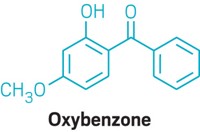Advertisement
Grab your lab coat. Let's get started
Welcome!
Welcome!
Create an account below to get 6 C&EN articles per month, receive newsletters and more - all free.
It seems this is your first time logging in online. Please enter the following information to continue.
As an ACS member you automatically get access to this site. All we need is few more details to create your reading experience.
Not you? Sign in with a different account.
Not you? Sign in with a different account.
ERROR 1
ERROR 1
ERROR 2
ERROR 2
ERROR 2
ERROR 2
ERROR 2
Password and Confirm password must match.
If you have an ACS member number, please enter it here so we can link this account to your membership. (optional)
ERROR 2
ACS values your privacy. By submitting your information, you are gaining access to C&EN and subscribing to our weekly newsletter. We use the information you provide to make your reading experience better, and we will never sell your data to third party members.
Environment
Sunscreen chemicals need environmental risk assessment, report says
by Cheryl Hogue
August 9, 2022
| A version of this story appeared in
Volume 100, Issue 28

The US Environmental Protection Agency should assess the risks that active ingredients in sunscreens pose to certain aquatic ecosystems, the National Academies of Sciences, Engineering, and Medicine recommends. The EPA should focus on the 15 organic chemicals and 2 inorganic compounds, individually and in combination, approved for US use as filters in sunscreens to protect skin from ultraviolet radiation, a report from the National Academies says. And the EPA should concentrate on ecosystems that have the heaviest exposure to sunscreen ingredients, such as coral reefs in shallow water with heavy recreational use and limited flow of sea water, it says. “An ecological risk assessment will help inform efforts to understand the environmental impacts of UV filters, and potentially clarify a path forward for managing sunscreens,” Charles A. Menzie, principal scientist at the consulting firm Exponent who chaired the committee that wrote the report, says in a statement. The congressionally mandated study says sunscreen makers and US federal agencies, including the National Science Foundation, should fund research on long-term ecological effects of UV-filtering sunscreen chemicals.





Join the conversation
Contact the reporter
Submit a Letter to the Editor for publication
Engage with us on Twitter